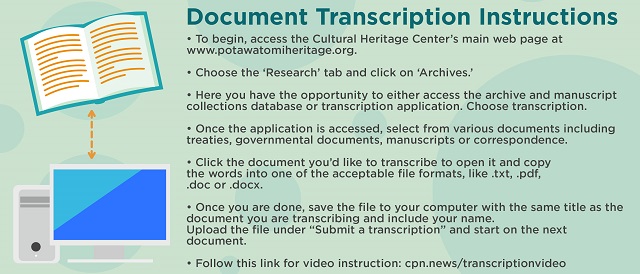The staff at the CPN Cultural Heritage Center is offering an opportunity for tribal members to volunteer and assist the archives staff while learning more about Potawatomi history by transcribing historic documents into digital text.
There are thousands of written and printed artifacts waiting to be processed by the CHC staff, but there aren’t enough hours in the day, so utilizing tribal members and others interested in Native American history creates a win-win for all involved.
Some of the documents are in book or manuscript formats, each of which can contain dozens or hundreds of pages; others are letters and handwritten notes. The CHC staff will continue to collect more as they visit various archives around the country and receive donations from tribal members.
“Volunteers have the opportunity to learn about the Nation, understand how the CHC serves the tribal membership and public at large and give back to the community by assisting with these critical processes,” said Tribal Archivist Blake Norton, who prompted the initiative. “The application has the opportunity to serve as an interactive digital exhibition on various tribal subjects that we are either unable to display in our galleries or those we would like to expand upon.”
The goal is to create a multi-faceted educational portal and provide the CHC with the opportunity to interact with the tribal membership. The program also allows tribal members and volunteers the opportunity to work with the Nation’s cultural and historical collections. Volunteers will assist staff in processing archival items and learn critical steps taken by CHC staff in managing and making these invaluable artifacts accessible. Vital information gleaned from the transcribed documents is applied to the online archive and manuscript collections database.
Volunteers will experience a portion of the work the CHC staff in the archive and research division does on a daily basis and will allow the cultural heritage center to make this information available to Potawatomi throughout the world.
“I think that volunteers will benefit from having the ability to be part of preserving their tribe’s history,” Cultural Heritage Center Director Kelli Mosteller, Ph.D., said. “I was once a tribal member living out of state and I remember how isolating it felt at times. This project is one avenue tribal members can take to engage with and learn a little more about the history of CPN tribal members, whether they are their own ancestors or not.”
Volunteers should refer to the instructions in the graphic to participate in the program. Please take advantage of this opportunity at cpn.news/DocumentTranscription.

